

Owning a cat means sharing your home and life with an adorable creature who relies on you to keep them safe, well fed and warm. In return, our feline friends give us lots of love and affection. Keeping our pets safe is of paramount importance and loving owners do all they can to do so. However, even the most well cared for cat will at some point in their lives suffer an injury of some sorts whether it's by accident or through having a fight with another cat or animal.
Naturally, the first thing you have to do if you think the injury is serious enough, is to call the vet and ask their advice. Vets are very willing to help pet owners with any enquiries or queries they may have concerning their animals so you should never think twice before asking for their help over the phone. If the injury merits a trip to the surgery, make sure your cat is comfortable on the way there and if needs be, wrap them in a towel or small blanket and carry them on your lap in the passenger seat of the car.
Most cats don't bleed profusely when they are bitten or cut unless the injury has hit a blood vessel that is. You should never manhandle the site of the injury as this may cause more bleeding. The steps you should take to deal with an injury of this nature are as follows:
If your cat is having trouble breathing, this is a very serious situation because if left too long, it can lead to brain damage. Because of this, you need to get your pet to the vet as a matter of emergency so veterinary care can be administered as quickly as possible. You should not waste any valuable time trying to help your cat to breath unless you are absolutely sure you know what to do, it is far better to leave this up to the experts.
If you suspect your cat may have broken a bone, you must never try to set this yourself or to leave it untreated. If there is any bleeding, you should first control this and you should restrict any movement. The best way to transport your pet is by wrapping them in a towel and then carrying them on your lap in the passenger seat.
Your cat would need to be hospitalised for a few days to make sure the bone is correctly set and this would need to be done under anaesthetic. However, the chances are your pet would also need to be given a course of antibiotics following their treatment which has to be completed for it to work. You should also give your cat a supplement to support their immune system which your vet would be able to recommend for you.
If you find your cat choking, you have to act quickly by doing the following:
Kittens and young cats like to chew on things they come across especially when they are teething and this includes electric wires and cords. If they do chew on one, they run the risk of being electrocuted. This may cause injuries which includes a burnt tongue, palate, lips and the corners of their mouths. Cats that experience an electric shock often salivate profusely and they have difficulty breathing.
If you think your cat has received an electric shock, you should do the following:
If you find your cat has suffered an injury to their eye, you need to get them to the vet as quickly as you can. The things you must do and not do, are as follows:
If your cat has stayed out on a particularly cold night, you may find they have suffered from frostbite which typically affects their extremities namely their ears, feet and their tails. The symptoms to watch out for include the following:
If your cat shows these symptoms, you need to do the following as quickly as possible:
You should then take your cat to the vet so they can examine the affected areas. The thing to remember is that frostbite is very painful and can cause permanent damage to affected areas.
If you think your cat is experiencing heatstroke, this is a very serious condition which needs to be dealt with immediately. Symptoms to watch out for include the following:
You would need to use cool water but not too cold and sponge this onto your cat to get their body temperature down, but you would have to get them to the vet as soon as you can so they can treat your pet. The quicker your pet is treated, the better the prognosis.
If you suspect your cat has ingested something they should not have, then you need to get them to the vet immediately. Symptoms to watch out for include the following:
You should never try to make your vomit as this could prove more harmful if not fatal.
Cats go into shock very easily if they have suffered any sort of traumatic injury which includes being hit by a car or falling from any heights. The symptoms to watch out for include the following:
If your cat shows any of the above symptoms, you need to wrap them in a towel and keep them warm with their heads in a lower position than their hearts and then get them to the vet as a matter of urgency.
 10 Lovely Ways Your Cat Shows You Their Love
10 Lovely Ways Yo
10 Lovely Ways Your Cat Shows You Their Love
10 Lovely Ways Yo
 Making Sure Horses Hooves Are In Good Condition This Season
Making Sure Horse
Making Sure Horses Hooves Are In Good Condition This Season
Making Sure Horse
 How To Know When Your Dog Is Sick
You know that my passion is my babies (four legged babie
How To Know When Your Dog Is Sick
You know that my passion is my babies (four legged babie
 Dermatitis In Dogs
Dermatitis In Dog
Dermatitis In Dogs
Dermatitis In Dog
 A Short Guide To Sheltie Guinea Pigs
A Short Guide To
A Short Guide To Sheltie Guinea Pigs
A Short Guide To
Copyright © 2005-2016 Pet Information All Rights Reserved
Contact us: www162date@outlook.com